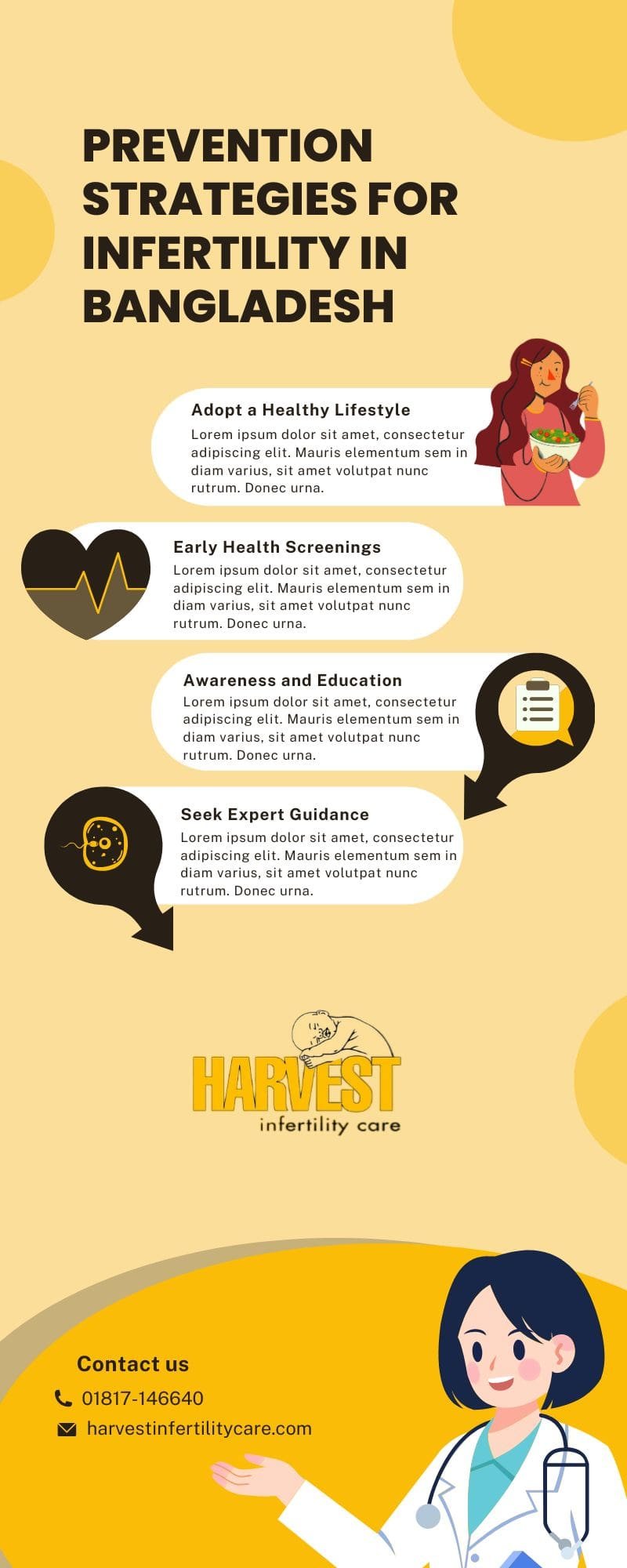Infertility is an increasingly prevalent issue in Bangladesh, affecting approximately 10-15% of couples who struggle to conceive naturally. The social and emotional implications of infertility are significant, often leading to stress, stigma, and strained relationships. Despite these challenges, advancements in medical science and infertility treatments have brought new hope to families across the nation. This article provides an in-depth exploration of infertility risk factors specific to Bangladesh, prevention strategies, and available treatment options.
Understanding Infertility
Infertility is defined as the inability to conceive after one year of regular, unprotected sexual intercourse for women under 35, and six months for women over 35. This condition can affect both men and women, with contributing factors varying widely. In Bangladesh, cultural norms, limited awareness, and delayed medical intervention often exacerbate the problem.

Infertility Risk Factors in Bangladesh
1. Lifestyle-Related Factors
Smoking and Tobacco Use
Tobacco consumption is widespread in Bangladesh, with a significant portion of the population using cigarettes or smokeless tobacco products like betel nut. Smoking affects sperm quality in men and impairs egg health in women.
Dietary Habits
A lack of balanced nutrition, especially in rural areas, can lead to deficiencies in essential vitamins and minerals, impacting reproductive health. Urban diets rich in processed foods and trans fats further contribute to hormonal imbalances.
Obesity and Malnutrition
Obesity is rising in urban centers due to sedentary lifestyles and poor dietary habits, while malnutrition remains prevalent in rural areas. Both extremes adversely affect fertility by disrupting hormonal balance.
2. Age-Related Fertility Decline
Delayed marriages and family planning, common in urban Bangladesh, increase the likelihood of age-related infertility. Women over 35 experience a natural decline in egg quality and quantity, making conception more difficult.
3. Environmental and Occupational Hazards
Industrial Pollution
High levels of air and water pollution, particularly in industrial regions like Dhaka and Chattogram, expose individuals to toxins that can impair reproductive health.
Workplace Risks
Exposure to heavy metals, pesticides, and prolonged stress in certain occupations increases the risk of infertility.
4. Medical and Health Conditions
Polycystic Ovary Syndrome (PCOS)
PCOS is one of the leading causes of infertility among Bangladeshi women, characterized by irregular menstrual cycles, hormonal imbalances, and ovarian cysts.
Endometriosis
This condition, where tissue similar to the uterine lining grows outside the uterus, often goes undiagnosed due to limited awareness and healthcare access.
Male Infertility
Low sperm count, poor motility, and abnormal morphology are common among men in Bangladesh, often linked to stress, smoking, or untreated infections.
5. Infections and Diseases
Sexually Transmitted Infections (STIs)
Limited sexual health education and stigma around discussing STIs lead to untreated infections, which can cause scarring of reproductive organs.
Tuberculosis
Pelvic tuberculosis, more prevalent in developing countries like Bangladesh, can damage fallopian tubes and the uterine lining, reducing fertility.
6. Psychological and Social Factors
Stress and Anxiety
The intense societal pressure to have children adds significant stress, which can disrupt hormonal balance and hinder conception.
Cultural Stigma
In many Bangladeshi households, women often bear the blame for infertility, leading to emotional distress and delayed medical intervention.

Prevention Strategies for Infertility in Bangladesh
Adopt a Healthy Lifestyle
Follow a balanced diet rich in fruits, vegetables, lean proteins, and whole grains.
Avoid smoking, excessive alcohol consumption, and recreational drugs.
Maintain a healthy weight through regular exercise.
Early Health Screenings
Regular health check-ups can identify potential risk factors like PCOS, infections, or low sperm count early on.
Awareness and Education
Participate in sexual health education programs to understand the importance of safe practices and early diagnosis.
Encourage open conversations about reproductive health to reduce stigma.
Seek Expert Guidance
Consult specialists at Harvest Infertility Care Ltd, where advanced diagnostic and treatment options are available to address complex fertility issues.
Treatment Options for Infertility in Bangladesh
1. Advanced Diagnostics
State-of-the-art diagnostic facilities at Harvest Infertility Care Ltd include hormone tests, imaging studies, semen analysis, and genetic evaluations to pinpoint the exact cause of infertility.
2. Assisted Reproductive Technologies (ART)
- In-vitro fertilization (IVF)
IVF is a widely available and highly effective option, where eggs and sperm are combined in a laboratory and implanted in the uterus. - Intracytoplasmic Sperm Injection (ICSI)
This technique directly injects a single sperm into an egg, ideal for severe male infertility.
3. Medication and Hormonal Therapy
Fertility medications help regulate ovulation and improve egg quality, while hormonal therapy addresses imbalances.
4. Surgical Interventions
For conditions like endometriosis or blocked fallopian tubes, surgeries offered at Harvest Infertility Care Ltd provide effective solutions.
5. Counseling and Emotional Support
Dealing with infertility can be emotionally taxing. Professional counseling services help couples navigate the challenges and maintain a positive outlook.
Why Choose Harvest Infertility Care Ltd?
Harvest Infertility Care Ltd is Bangladesh’s leading infertility treatment center, offering:
- Highly experienced specialists.
- Cutting-edge technology and personalized care.
- Comprehensive fertility services, including IVF, ICSI, and advanced diagnostics.
Their patient-centric approach ensures that every couple receives the care and support needed to achieve their dream of parenthood.
Conclusion
Infertility is a complex issue influenced by lifestyle, environmental, and medical factors. By understanding these risk factors and seeking timely intervention, couples in Bangladesh can overcome infertility challenges. With expert care from Harvest Infertility Care Ltd, the best infertility treatment center in the country, there is hope for every couple on their journey to parenthood.